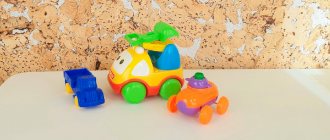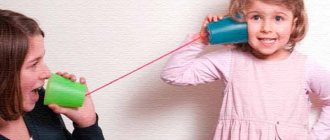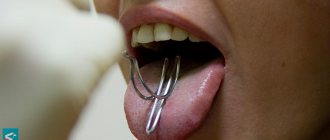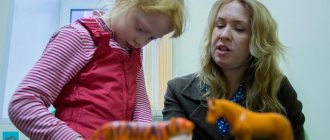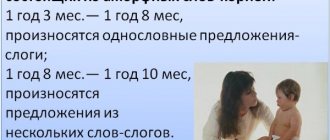Lack of speech in children aged two years often becomes a cause for concern for parents. They are puzzled by questions like how to teach a baby to speak? Is the child developmentally behind his peers? Or maybe you should have sounded the alarm a long time ago and turned to specialists for help?
Parental attitude towards the “silence” of their two-year-old child is divided into two categories:
- Excessive concern. When a child at 18 months does not know the alphabet and does not communicate in detailed sentences, unlike the neighbor's boy Sasha, who at 2 years old spoke in complex sentences.
- Ignoring the problem. When doctors agree on a common opinion and diagnose “developmental delay”, and parents persistently ignore this fact. It seems to them that the baby is absolutely healthy and there is no problem.
The term “speech development delay” (SSD) refers to the slow pace of acquisition of oral speech by children under three years of age.
Normal or pathological?
The development of each child occurs according to an individual schedule, as does the formation of speech. The verbal communication skills of 2-year-old children are so individual that they can differ significantly among peers born within a couple of months of each other. But all children, without exception, experience the main periods of speech development.
Stages and conditional norms of speech development:
- 2-3 months - partying. The baby reacts to the voices of mom and dad. He begins to make his first sounds, responding in his own way to his parents’ calls. At this stage, dialogical speech is formed.
- 4-8 months – babbling. The child repeats the simplest syllables of vowels and consonants (cha-cha, nya-nya-nya, boo-boo). Some mothers are happy when they hear the first word “ma-ma” from their child. In fact, this is a random repeated syllable, the meaning of which the baby is not yet aware of.
- 9-12 months – the baby imitates the speech sounds of adults. During this period, the passive vocabulary is actively replenished (words that he hears and understands, but does not pronounce).
- At 12-18 months, the child pronounces his first conscious words, knows and pronounces the sounds of some animals, understands and responds to requests from adults (“put it down,” “sit down,” “bring it,” “eat”). When pronouncing words, the child may “lose” or “replace” sounds and syllables (kotka – “kotka”).
- 2 years – formation of an active vocabulary. The baby learns to put words into sentences and express his thoughts.
- 3 years – the child’s speech becomes understandable to others. He easily formulates his demands, asks questions, actively uses verbs, conjunctions, prepositions in his speech, and is familiar with quantitative concepts (“many”, “one”).
There is no single age standard according to which a child should speak.
For most children, this occurs from 14-18 months from the moment of their birth.
Short poem about a lion
Papa gave me a lion! Oh, I was chicken at first! I was afraid of him for two days, and on the third - he broke down!
Water
Water, water, Wash my face, So that my eyes shine, So that my cheeks blush, So that my mouth laughs, So that my teeth bite.
Short poem about winter
The cars were covered in snow. The paths are covered with snow, I will decorate them with fresh traces. - Have fun, legs!
Magpie
You fly, magpie, far, far away, bring some candy for the little baby.
What signs indicate delayed speech development?
There is no need to worry if the baby is sociable, smart, communicates with family members and others using gestures and sounds, responds to your requests, understands the words you say to him, and is capable of onomatopoeia. Such children can stubbornly remain silent until they are three years old, but then they actively begin to talk, even surpassing their peers. We are talking about a tempo delay in speech when the baby spoke on his own, without any measures taken. This is a normal phenomenon that can occur in a completely healthy child. But there is another problem when a delay in speech development is an alarming “bell” signaling serious violations.
What parents should be wary of:
- After 3-4 weeks from the moment of birth, the baby has no reaction to the voices of adults.
- No noise in 2-4 months.
- At 8-9 months, no sounds or babbling are heard from the child.
- At 1-1.5 years old, does not pronounce simple syllables (ma-ma, boo-boo), does not respond to his name.
- Since the age of one and a half years, he has not heard words or requests. There are problems with chewing food.
- Doesn't use gestures, achieves everything only by crying.
- At 2 years old, he cannot speak in phrases, does not strive to learn new words, confuses body parts, does not know the names of elementary objects, and cannot point to them. The vocabulary is scanty, no more than 20 words.
The final diagnosis of RRD can only be made by doctors after a comprehensive examination.
Chickens
Hens-hens: “Ko-ko-ko! We laid eggs; Cuckoo-coo-coo, little kids!”
Tanya and the ball (A. Barto)
Our Tanya is crying loudly: She dropped a ball into the river. - Hush, Tanechka, don’t cry: The ball won’t drown in the river.
Rhyme Ku-ka-re-ku!
The cockerel woke up early, woke up the goose and the ram, and shouted right into the bull's ear: - Ku-ka-re-ku!
Ladushki
Okay, okay, let's bake pancakes. We'll put it on the window. Let's make it cool down. When it cools down, we’ll eat it and give it to the sparrows.
What caused the delay in speech development?
The reasons for the development of speech are divided into physiological and social.
Physiological reasons:
- Perinatal pathologies (threat of miscarriage during pregnancy, prematurity, asphyxia during childbirth).
- Heredity.
- Lesions of the central nervous system due to intrauterine and birth injuries, infectious and viral diseases at an early age.
- Hearing impairment.
- Skull injuries.
- Poor development of the speech apparatus, impaired articulation - lips, tongue, facial muscles, soft palate.
- Diseases of a neurological nature.
When a developed and absolutely healthy baby at 2 years old does not speak or does it very poorly, the reasons may be of a social nature:
- The child is deprived of parental attention.
- The baby, on the contrary, is too surrounded by the care of his family and does not feel the need for verbal communication. All his demands are immediately fulfilled, you just need to show with a gesture what he needs. Mothers, having heard a slurred word, immediately understand what it is about. The baby gets used to this attitude and is lazy to talk.
- Unfavorable family environment, constant stress.
- Staying away from mother.
- The family communicates in two or more languages.
- Integrity and stubbornness. The child resists in every possible way the attempts of adults to teach him to speak, showing his character.
- Until the age of 2-3 years, children accumulate vocabulary, and after that they begin to use phrases and extended sentences.
What should a 2 year old child be able to do?
By age two, children should:
1. Be able to navigate in space, that is, understand that the object is located:
• in something or outside of something (a ball in a box, a bear in another room);
• indoors or outdoors;
• above or below.
2. Be able to characterize the quality of objects, for example:
• that the cat is soft;
• scarf - prickly;
• napkin - dry or wet.
• water from the tap (or food on the plate) - cold or hot.
3. Be able to recognize parts of the body, know and be able to show:
• legs;
• hands;
• torso;
• head.
4. Be able to recognize:
• basic standard colors - red, white, green, blue, etc.
• big small;
• items and objects - a bear, a doll, a car, a house;
• shapes of objects - square, oval, star, circle.
Some children can use their fingers to count to 5.
What measures to take in case of ZRR?
If you suspect your baby has a delay in speech development, do not put off visiting a specialist.
It is important to take timely measures, since this problem has a steady increase in dynamics, which will subsequently lead to the formation of a delay in psycho-speech development (DSRD) in the child.
Some parents mistakenly believe that speech therapists treat mental disorders. But they will only teach the child to speak various sounds, make sentences orally, and conduct speech therapy massage of the speech apparatus to improve diction.
In case of mental retardation, in addition to a speech therapist, you will need to consult the following specialists:
- neurologist;
- speech pathologist;
- child psychologist.
Only a specialist will be able to identify the problem, if any, and prescribe the correct treatment.
Tempo delay in speech development
A communicative “push” will help to bring the child out of the state of delayed speech. They benefit from communication with speaking peers, speech games and exercises, and classes with a speech therapist, which help children develop speech.
The lion's share of the work on developing the baby's speech will fall on the parents themselves. They are the best teachers for their child.
The tempo delay can be corrected by parents independently. It is enough to approach your work responsibly and devote several hours a day to activities with children.
Techniques and exercises:
- Do not use the TV as background noise, as this negatively affects the speech development of the baby.
- Play educational games. This includes sorters, cubes, cut cards, and inserts.
- Read books, poems, nursery rhymes, and fairy tales to your child before bed.
- Sing funny children's songs and bedtime lullabies.
- Look at pictures of animals with your child and talk about them.
- Watch animated films together, saying the names of the characters and the actions of the heroes.
- Let's drink liquid (compotes, juices, milkshakes) from a straw. This will strengthen the muscles of the mouth and make it easier to reproduce words.
What you should absolutely not do in relation to your baby:
- Compare your child with other people's talking children of friends, relatives, neighbors. Remember that your baby is unique and develops on his own schedule.
- Turn a blind eye to the existing problem. If the baby still shows signs of delayed speech development, you should not let the situation take its course, you should immediately visit a specialist.
- Obsess over. When children at 2 years old have not yet begun to speak, mothers fall into despair. All their thoughts are occupied with one thing: how to make a child speak?
Nimble fingers
Training fine finger movements has a great influence on the development of a child’s active speech. This phenomenon has long been known to psychologists and speech therapists. And they never tire of repeating how important it is to develop fine motor skills. A variety of finger games, manipulations with paper (it can be torn into small pieces, crumpled, crumpled), and unscrewing and tightening the lids on cans and bottles will help with this.
As always, an inexhaustible resource in this regard is an ordinary kitchen. My child, for example, really liked hiding small toys from Kinder Surprises in a bowl of dry peas or lentils, and then finding them by touch (be careful, Kinder Surprises often contain small parts that, of course, should not be given to the baby). The peas gently massage little fingers, and the baby receives many pleasant tactile sensations. Try it yourself!
You can draw with your fingers on a tray on which a thin layer of flour or semolina is sprinkled. You can play with cotton swabs, taking them out of the jar one at a time and then putting them back in. You can attach colorful clothespins to a plastic jar or box, and then unhook them and throw them into the same jar.
Look around, and perhaps you will find a new interesting and useful activity for your little one.
About the benefits of articulation gymnastics and breathing exercises
To teach a child to speak and clearly pronounce sounds, talking and communicating with him alone will not be enough. It is important to do articulation gymnastics at the same time. Training the articulatory apparatus contributes to the correct pronunciation of words in the future.
Below are several articulation gymnastics exercises. Demonstrate and explain to your child how to perform them. He will love this fun idea.
"Pendulum". Open your mouth and move your tongue like a pendulum from side to side, touching the corners of your mouth.
Using your tongue, try to reach the tip of your nose, chin, and cheeks.
"Fence". You need to close your teeth tightly so that your tongue remains behind the fence, and smile widely.
“Open and close your mouth.” Having opened your mouth, you need to stay in this position for a few seconds and then close it.
"Baby Elephant's Trunk" Pull your lips forward like a tube and breathe.
"Piglet." Move your elongated lips in a circle, left and right, up and down.
"Hamster". Take a breath into your mouth, pretending to be a hamster. Alternately deflate the left and right cheek. Then, on the contrary, pull in your cheeks strongly. Inflate and use your palms to deflate them.
Developmental activities at home
Active communication with the child should begin immediately after birth. Even when he cannot yet babble clearly, eye contact is important; you introduce him to the world with the help of your gestures and intonation. This way you will develop emotional stability in him. Gradually he will compare the movements of the facial muscles and sounds.
At two years of age, to compensate for speech impairments, it is necessary to practice daily, while avoiding overwork or loss of interest. 10-20 minutes a day is enough, focus on your baby’s temperament. In addition to repeating words, you need to read children's books to improve your vocabulary. Riddle riddles with a rhyming answer. To achieve simple constructions or get a silent person to talk, study them according to topics and characteristics. In the same way, you can learn complex and long words: shop, so-baka, car, road, the parent starts, and the baby finishes. When working on imagination, it is necessary to expand the child’s horizons, ask him why a certain object is needed.
Games with animal sounds that can be portrayed in turns will be useful. Developing attentiveness, lay out toys on the table and quietly hide one at a time. Change roles with your baby periodically. To strengthen the muscles of the articulatory apparatus, you can do simple gymnastics, for example, making funny faces, stretching your mouth into a wide smile and stretching your lips in a tube.
Art creativity develops those areas of the brain that are responsible for speech functions. For the same purpose, you can play nursery rhymes, accompanying the story with hand movements (“Ladushki”, “We shared an orange”). To improve motor skills, let your baby work with plasticine, dough, buttons or beads. Of course, under your supervision to avoid accidental swallowing of small objects. On store shelves there is a large selection of children's educational books, manuals, toys, construction sets, where each parent can choose an activity according to their preferences. You can also diversify your leisure time with a trip to the zoo.

